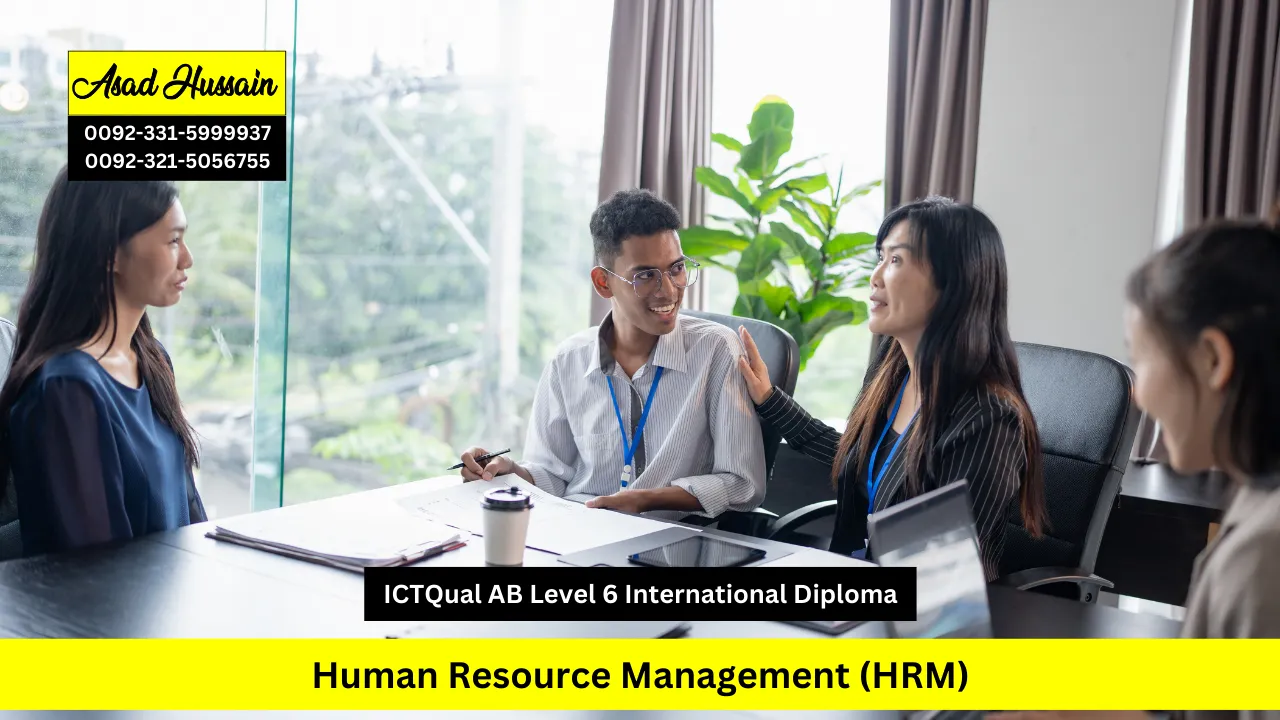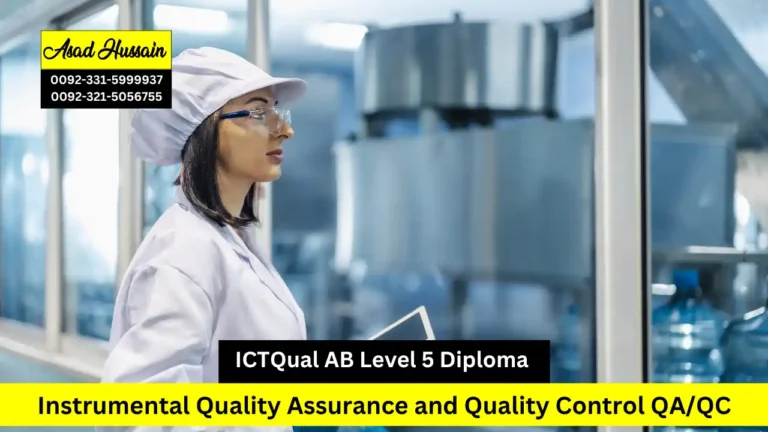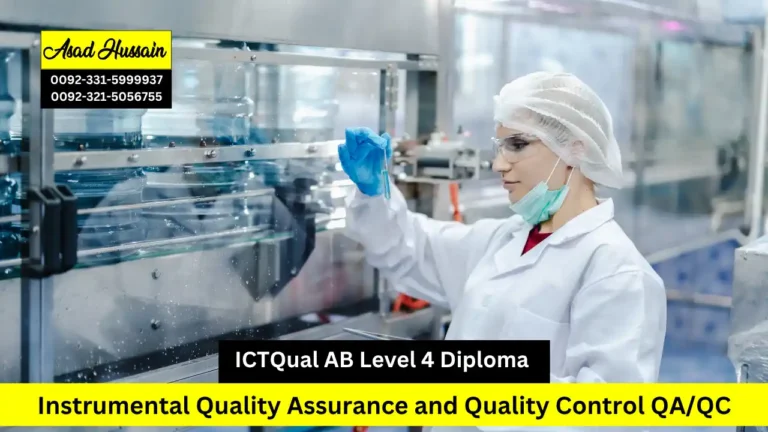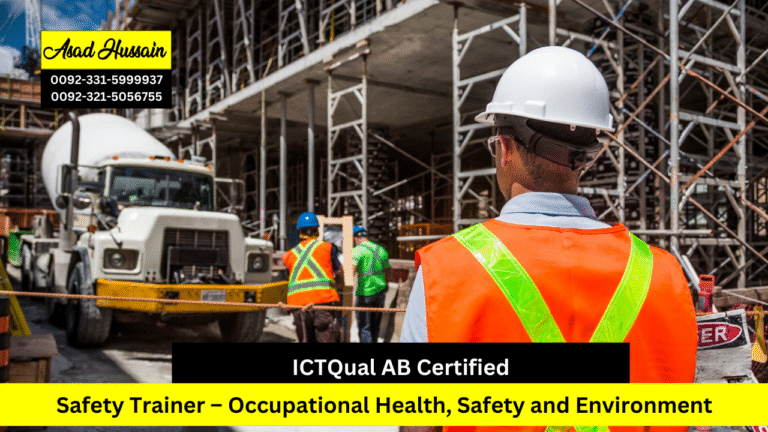The ICTQual AB Level 6 International Diploma in Human Resource Management (HRM) is a globally recognized qualification designed to equip learners with advanced knowledge, practical skills, and strategic insights essential for managing human capital in modern organizations. In today’s competitive business environment, effective human resource management is critical to attracting, developing, and retaining talent, enhancing employee engagement, and driving organizational success.
ICTQual AB Level 6 International Diploma in Human Resource Management (HRM), totaling 360 credits, caters to both fresh learners seeking to start a career in HRM and experienced professionals aiming to advance their expertise. The curriculum blends theoretical foundations with applied practices, covering areas such as workforce planning, talent acquisition, performance management, employee relations, compensation and benefits, organizational development, and HR analytics.
Learners will develop critical skills in strategic HR planning, leadership, conflict resolution, recruitment, and employee development. Through case studies, projects, and practical exercises, students gain hands-on experience in implementing HR strategies, conducting performance evaluations, managing workplace diversity, and aligning HR policies with organizational goals.
Graduates of this program will be prepared for careers in HR management, consultancy, organizational development, and leadership roles across private, public, and non-profit sectors. They will possess the ability to design and implement effective HR strategies, manage teams, resolve workplace issues, and contribute to the growth and sustainability of their organizations.By completing this diploma, learners gain a globally recognized qualification that not only enhances professional competence but also provides pathways for higher studies and strategic leadership roles in human resource management, empowering them to make a meaningful impact in their organizations.
Program Highlights
Study Units
This qualification, the ICTQual AB Level 6 International Diploma in Human Resource Management (HRM), consists of 36 mandatory units.
Year 1 – Foundation in Human Resource Management
- Introduction to Human Resource Management
- Principles of Organisational Behaviour
- Fundamentals of Business Management
- Employment Law and Workplace Regulations
- Communication Skills for HR Professionals
- Workforce Planning and Recruitment
- Employee Relations and Workplace Culture
- Diversity, Equity, and Inclusion in HRM
- Fundamentals of Training and Development
- Introduction to Performance Management
- Research Methods in Human Resource Management
- Professional Ethics and Corporate Responsibility
Year 2 – Intermediate Human Resource Management
- Strategic Human Resource Management
- Human Capital Development and Talent Management
- Organisational Learning and Knowledge Management
- Advanced Employee Relations and Negotiation
- Compensation and Benefits Management
- Labour Law and International HR Practices
- Human Resource Information Systems (HRIS)
- Leadership and Team Development
- Conflict Resolution and Workplace Mediation
- Project Management in Human Resources
- Research and Data Analysis for HRM
- Professional Development and Reflective Practice
Year 3 – Advanced Human Resource Management
- Global Human Resource Management
- Strategic Workforce Planning and Analytics
- Advanced Performance Management Systems
- Leadership in Organisational Transformation
- Corporate Governance and HRM Compliance
- International Labour Relations and Policies
- Risk Management and Employee Wellbeing
- HRM in Multinational and Cross-Cultural Contexts
- Innovation and Change Management in HRM
- Sustainable HRM and Corporate Social Responsibility
- Advanced Research in Human Resource Management
- Capstone Project in Human Resource Management
The ICTQual AB Level 6 International Diploma in Human Resource Management (HRM) is designed for learners who aspire to advance their careers in human resources, organizational development, and leadership. To ensure learners can successfully complete the program, applicants must meet the following entry requirements.
Age Requirements
- Applicants must be at least 18 years old at the time of enrollment.
- No maximum age limit; both fresh learners and mature professionals are welcome.
- Mature learners with relevant work experience may be considered on a case-by-case basis.
Educational Requirements
- A recognized Level 5 qualification or equivalent in Human Resource Management, Business Management, Social Sciences, or related fields.
- Applicants with a high school diploma plus significant relevant experience may also be considered.
- Strong analytical, interpersonal, and communication skills are preferred.
Professional Experience
- Fresh learners without prior work experience are eligible to apply.
- Professionals with at least 2–3 years of verifiable experience in HR, recruitment, or organizational management may receive additional recognition.
- Volunteer or internship experience in HR or related roles is considered advantageous.
English Language Proficiency
- Applicants must demonstrate proficiency in English for effective participation in assessments and course materials.
- Acceptable qualifications include IELTS 5.5 (or equivalent) or prior education in English.
- Applicants not meeting this requirement may be required to complete an English proficiency test.
These entry requirements ensure learners possess the academic foundation, professional experience, and language skills needed for success. Whether starting a career in HR, organizational development, or strategic management, the ICTQual AB Level 6 International Diploma in Human Resource Management (HRM) provides a structured pathway to achieve international career opportunities.
The following learning outcomes outline the specific knowledge, skills, and practical competencies that learners will gain upon completing the ICTQual AB Level 6 International Diploma. Designed to meet international academic and professional standards, these outcomes provide clear, measurable objectives across all units, ensuring learners are fully equipped to apply theoretical concepts in real-world professional contexts and advance their careers.
Year 1: Foundation in Human Resource Management
Introduction to Human Resource Management
- Understand the core functions, roles, and responsibilities of HR professionals.
- Analyze the strategic importance of HRM in achieving organizational objectives.
- Apply basic HR principles to workplace scenarios and case studies.
Principles of Organisational Behaviour
- Examine individual, group, and organizational behavior in the workplace.
- Analyze factors affecting motivation, leadership, and team dynamics.
- Apply organizational behavior theories to improve employee engagement and productivity.
Fundamentals of Business Management
- Understand key business functions, management principles, and organizational structures.
- Analyze business strategies and their alignment with HR policies.
- Apply management concepts to support organizational decision-making and HR initiatives.
Employment Law and Workplace Regulations
- Understand national and international employment laws and workplace regulations.
- Analyze legal obligations related to contracts, health and safety, and employee rights.
- Apply legal knowledge to ensure compliance and reduce organizational risk.
Communication Skills for HR Professionals
- Develop effective written and verbal communication skills for HR contexts.
- Analyze communication challenges in diverse workplace environments.
- Apply communication strategies for conflict resolution, negotiations, and employee engagement.
Workforce Planning and Recruitment
- Understand workforce planning, talent acquisition, and recruitment strategies.
- Analyze job requirements and design effective recruitment processes.
- Apply practical tools to attract, select, and retain suitable candidates.
Employee Relations and Workplace Culture
- Examine the principles of employee relations and organizational culture.
- Analyze factors influencing employee satisfaction and performance.
- Apply strategies to foster positive workplace relationships and a supportive culture.
Diversity, Equity, and Inclusion in HRM
- Understand the importance of diversity, equity, and inclusion in organizations.
- Analyze barriers to inclusion and develop strategies to promote workplace equity.
- Apply inclusive HR practices to enhance organizational effectiveness.
Fundamentals of Training and Development
- Understand employee training needs and learning theories.
- Analyze methods for designing, delivering, and evaluating training programs.
- Apply training strategies to enhance workforce skills and performance.
Introduction to Performance Management
- Understand the principles and tools of performance management systems.
- Analyze employee performance data to identify development opportunities.
- Apply performance evaluation techniques to support employee growth and organizational goals.
Research Methods in Human Resource Management
- Understand qualitative and quantitative research methods relevant to HRM.
- Analyze workplace data to identify trends, challenges, and opportunities.
- Apply research findings to support HR decision-making and policy development.
Professional Ethics and Corporate Responsibility
- Understand ethical standards, corporate governance, and professional conduct in HR.
- Analyze ethical dilemmas in workplace and HR practices.
- Apply ethical principles to HR policies, decision-making, and organizational behavior.
Year 2: Intermediate Human Resource Management
Strategic Human Resource Management
- Understand strategic HRM principles and their alignment with organizational goals.
- Analyze HR policies and practices to enhance organizational performance.
- Apply strategic frameworks to develop effective HR strategies and initiatives.
Human Capital Development and Talent Management
- Examine methods for identifying, developing, and retaining top talent.
- Analyze workforce potential and succession planning strategies.
- Apply talent management techniques to improve employee performance and engagement.
Organisational Learning and Knowledge Management
- Understand the concepts of organizational learning and knowledge transfer.
- Analyze methods for capturing and sharing organizational knowledge.
- Apply knowledge management strategies to enhance workforce capability and innovation.
Advanced Employee Relations and Negotiation
- Examine advanced principles of employee relations and workplace negotiation.
- Analyze labor-management interactions and collective bargaining processes.
- Apply negotiation and mediation techniques to resolve complex workplace conflicts.
Compensation and Benefits Management
- Understand frameworks for designing equitable compensation and benefits programs.
- Analyze pay structures, incentives, and reward systems.
- Apply compensation strategies to motivate employees and ensure legal compliance.
Labour Law and International HR Practices
- Examine domestic and international labor laws and regulations.
- Analyze global HR practices and compliance requirements.
- Apply legal knowledge to manage workforce issues in multinational environments.
Human Resource Information Systems (HRIS)
- Understand HRIS tools for managing employee data and HR processes.
- Analyze data to support decision-making and HR reporting.
- Apply HRIS software to streamline recruitment, payroll, and performance management.
Leadership and Team Development
- Examine leadership theories and their application in HR contexts.
- Analyze team dynamics and strategies for effective collaboration.
- Apply leadership and team development techniques to enhance organizational outcomes.
Conflict Resolution and Workplace Mediation
- Understand conflict management models and mediation strategies.
- Analyze causes and impacts of workplace disputes.
- Apply conflict resolution skills to create a positive and productive work environment.
Project Management in Human Resources
- Understand principles of project management within HR contexts.
- Analyze project objectives, scope, and resource allocation.
- Apply project management techniques to deliver HR initiatives effectively.
Research and Data Analysis for HRM
- Develop advanced research skills to gather, interpret, and analyze HR data.
- Examine workforce trends, employee satisfaction, and HR metrics.
- Apply evidence-based insights to inform HR strategy and decision-making.
Professional Development and Reflective Practice
- Understand the importance of continuous professional development in HR.
- Analyze personal performance and identify areas for growth.
- Apply reflective practice techniques to improve HR competence and effectiveness.
Year 3: Advanced Human Resource Management
Global Human Resource Management
- Understand HRM practices and strategies in global organizations.
- Analyze cross-border workforce challenges and international HR regulations.
- Apply global HR frameworks to manage talent, compliance, and workforce diversity effectively.
Strategic Workforce Planning and Analytics
- Examine methods for strategic workforce planning and HR analytics.
- Analyze workforce data to identify trends, gaps, and future talent needs.
- Apply data-driven strategies to optimize workforce allocation and performance.
Advanced Performance Management Systems
- Understand advanced performance appraisal methods and evaluation frameworks.
- Analyze employee performance data to inform development and reward strategies.
- Apply performance management systems to enhance productivity and organizational outcomes.
Leadership in Organisational Transformation
- Examine leadership models for driving organizational change and transformation.
- Analyze the role of HR in supporting strategic initiatives and culture change.
- Apply leadership techniques to guide teams through complex organizational transitions.
Corporate Governance and HRM Compliance
- Understand corporate governance principles and HR compliance requirements.
- Analyze regulatory frameworks affecting HR policies and procedures.
- Apply compliance strategies to ensure ethical and legal HR practices.
International Labour Relations and Policies
- Examine labor relations frameworks and employment policies in international contexts.
- Analyze the impact of collective bargaining, labor unions, and policy variations across countries.
- Apply legal and strategic knowledge to manage international labor relations effectively.
Risk Management and Employee Wellbeing
- Understand risk management strategies related to workforce health and safety.
- Analyze employee wellbeing programs and occupational risk factors.
- Apply risk mitigation techniques and wellbeing initiatives to improve organizational resilience.
HRM in Multinational and Cross-Cultural Contexts
- Understand challenges of managing diverse and multicultural workforces.
- Analyze cultural influences on HR policies, employee engagement, and leadership.
- Apply cross-cultural management strategies to enhance collaboration and productivity.
Innovation and Change Management in HRM
- Examine innovative HR practices and change management methodologies.
- Analyze the impact of technological, organizational, and cultural changes on HR.
- Apply innovative solutions to improve HR processes and support business transformation.
Sustainable HRM and Corporate Social Responsibility
- Understand sustainable HR practices and CSR initiatives.
- Analyze environmental, social, and ethical considerations in HR strategy.
- Apply sustainable and socially responsible HR practices to enhance organizational impact.
Advanced Research in Human Resource Management
- Conduct independent research on complex HR challenges.
- Analyze qualitative and quantitative HR data to inform strategy and decision-making.
- Apply research findings to solve practical HR problems and improve organizational outcomes.
Capstone Project in Human Resource Management
- Integrate knowledge from all units to complete a comprehensive HR project.
- Conduct applied research, analysis, and strategy formulation for real-world HR scenarios.
- Present findings and recommendations professionally to demonstrate HR expertise.
The ICTQual AB Level 6 International Diploma in Human Resource Management (HRM) is designed for learners who aspire to develop advanced expertise in human capital management and organizational leadership. The program is suitable for both fresh learners and experienced professionals.
Career Starters
- Fresh graduates seeking an internationally recognized qualification in HRM.
- Individuals aiming to enter human resources, recruitment, or training and development.
- Learners interested in understanding organizational behavior, workforce planning, and employee relations.
Aspiring HR Professionals
- Professionals looking to enhance strategic HR management skills.
- Individuals aiming to develop expertise in performance management, HR analytics, and talent management.
- Those seeking leadership roles in HR departments or teams.
Experienced Practitioners
- Professionals seeking to advance their careers in HR management or consultancy.
- Individuals aiming to transition into senior HR, organizational development, or policy-making roles.
- Learners working in multinational or cross-cultural HR environments.
Global HR Practitioners
- Individuals interested in international labor laws and global HR practices.
- Professionals aiming to manage diverse, multicultural teams effectively.
- Learners seeking to implement sustainable HR and corporate social responsibility strategies.
This program is ideal for motivated learners committed to acquiring the knowledge, skills, and practical competencies required to excel in human resource management, lead organizational change, and contribute strategically to business growth.
The ICTQual AB Level 6 International Diploma in Human Resource Management (HRM) can be achieved through two distinct routes, depending on the learner’s experience and background. As an approved centre of ICTQual AB, learners must enrol with us to pursue this internationally recognized qualification.
Route 1: Experienced Professionals
- Designed for candidates with at least 6 years of verifiable professional experience in human resource management or related fields.
- Applicants can leverage their work experience to gain direct entry to the diploma.
- Experienced learners will be assessed on their practical knowledge and prior achievements.
- No requirement to complete all 36 assignments, but certain assessments may be required to validate competencies.
- Successful candidates receive the full ICTQual AB Level 6 International Diploma in Human Resource Management (HRM).
Route 2: Fresh Candidates
- Designed for learners with little or no professional experience in HRM.
- Candidates are required to complete all 36 assignments across the three-year program.
- The curriculum provides structured learning, practical exercises, and applied projects to build HR knowledge and skills.
- Assessments ensure learners meet international standards in HRM practices, ethics, and strategic management.
- Upon successful completion, candidates are awarded the ICTQual AB Level 6 International Diploma in Human Resource Management (HRM).
Both routes offer a globally recognized qualification that equips learners with advanced HR knowledge, strategic skills, and practical competencies essential for professional growth and leadership in human resource management.







